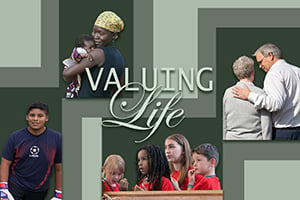Jesus said, “I came so that they could have life — indeed, so that they could live life to the fullest” (John 10:10, CEB).
United Methodists value human life and strive to help all experience life to the fullest.
Including during pregnancy, for both the mother and the unborn life she carries.
We also recognize that situations arise that make it impossible for a pregnant woman to continue to provide care for her unborn child.
Learn more
Sometimes the pregnancy cannot proceed without endangering the life of the mother, or unborn child, or both.
And sometimes the mother cannot continue care for the child after birth.
When the pregnancy cannot proceed safely: Abortion
Medical emergencies during pregnancies can happen to any pregnant woman, anytime, anywhere. Worldwide maternal mortality is the leading cause of death for women of childbearing age. Every 90 seconds a woman dies somewhere in the world from complications during pregnancy or childbirth. For every woman who dies, another 20 suffer disability. And in many of these cases, the unborn life she carries dies as well.
United Methodists affirm that when “tragic conflicts of life versus life” happen during pregnancy, abortion may be a justifiable resolution. And because such situations can happen anytime, anywhere, United Methodists worldwide affirm and support the legal availability and widespread accessibility of medically-supervised abortion services.
United Methodists value life, and our positions on the circumstances where abortion is justifiable and the need for its widespread legal accessibility reflect that. Our life-centered ethics call for as much life as possible to be honored and preserved. When caring for the unborn puts the life of the pregnant woman at risk, abortion may be the better way to ensure the preservation of as much life as possible.
Our ethics are life-centered, not choice-centered.
Special series

United Methodists do not support abortion on the basis of “a woman’s right to choose.” And United Methodists do not support “abortion on demand,” or simply because it is requested.
Further, our life-centered ethics do not affirm abortion as a means of birth control. United Methodists reject abortion “as a means of gender selection or eugenics.” And we reject late-term abortions except when the mother's life is in danger, the fetus has already died, or there are severe fetal abnormalities incompatible with life.
While United Methodists understand the need for women to have access to safe, legal abortions when necessary, we are also committed to diminishing high abortion rates. We encourage ministries that reduce unintended pregnancies, such as sex education, access to voluntary family planning, contraception, and “initiatives that enhance the quality of life for all women and girls around the globe.” These efforts enable women to plan their pregnancies, have healthy babies, avoid unwanted pregnancies, and to stay healthy and alive.
Finally, our life-centered ethics call United Methodists to minister with those who have had an abortion, offering presence and support regardless of the circumstances in which it occurs. Abortion always comes with a sense of loss and need for healing for the mother and for others close to her.
When the mother cannot continue care after birth: Adoption
Life-threatening complications during pregnancy may not be the only factor that make it impossible for a mother to continue to provide lifelong care for her unborn child. Other circumstances may mean a better outcome for mother and child is to make the child available for adoption.
United Methodists encourage adoption rather than abortion in all cases where the mother finds she cannot raise her child.
The Social Principles call United Methodist congregations to assist women seeking adoption with appropriate resources and support, including assistance in obtaining appropriate legal assistance. And they call United Methodists to support adoptive parents, recognizing and affirming their desire to raise their adoptive child as they would their own biological child.
All Christians facing such situations where care for an unborn life or a born child can no longer continue are called to prayer, searching the Scriptures, and all other means of seeking God’s will, guidance, and wisdom. United Methodists also encourage such persons to seek the counsel of parents, family members, clergy, and professionals in both medicine, counseling, and adoption so the best outcomes, the most abundant life for all involved, can be discerned.
This content was produced by Ask The UMC, a ministry of United Methodist Communications.





